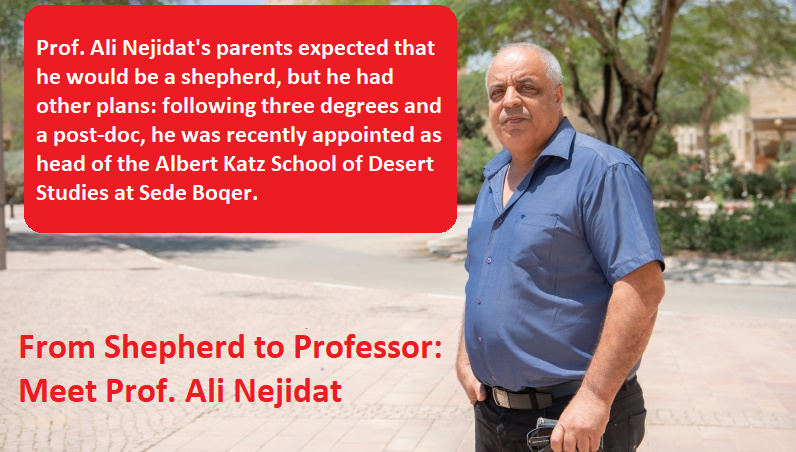
Prof. Ali Nejidat's parents expected that he would be a shepherd, but he had other plans: following three degrees and a post-doc, he was recently appointed as head of the Albert Katz International School for Desert Studies at Sede Boqer.
Prof. Nejidat (61) was born in the village Bu'eine Nujeidat in the north, one of ten children. His parents intended for him to be a shepherd, but he wanted to go to school. "At school I felt that I was somebody," he says. "I felt important because I was an excellent student."
At school, the young Ali fell in love with biology. When he finished high school, he enrolled to study biology at BGU, and completed three degrees in the Department of Life Sciences. He then travelled to do a post-doc at the University of Washington, specializing in genetic engineering. In 1991, he joined the Jacob Blaustein Institutes for Desert Research (BIDR) as a researcher in the field of environmental microbiology. Now he has been appointed as head of the Albert Katz International School for Desert Studies, which is part of the BIDR, which includes the Zuckerberg Institute for Water Research (ZIWR), The French Associates Institute for Agriculture and Biotechnology of Dryland (FAAB) and The Swiss Institute for Dryland Environmental and Energy Research (SIDEER).
"My appointment was pretty natural," he says. "I care about the School and the students. Around 40% of the planet's landmass is desert areas, and they are only increasing in size because of global warming. We prepare our 200 students, who come from all over the world, to solve the problems of the future which will be created because of these changes."
Today Prof. Nejidat lives in Beer-Sheva with his wife Halla, who is an educational counsellor. His three children also studied at BGU. Today one works at the Ministry of Finance, one is a lawyer and another a medical student.
His aim is to encourage young people from the Arab sector to continue to advanced education. "Universities are seeking excellent researchers, with no relationship to their ethnic origin," he says. "When I took on this position, I had a vision to enroll students from the Arab sector and from neighboring countries. Climate change has no borders and what is happening in the deserts around us affects all of us. Coping with climate change and desertification is a global task and needs international cooperation with no connection to politics.
The School at Sede Boqer is currently celebrating its 20th anniversary. The study program exposes students to the desert phenomenon from the comprehensive systemic perspective, and the teaching language in the program is English. The students themselves, more than 200, live on the Sede Boqer campus in dorms built with materials suited for a desert climate, while taking into consideration the surrounding environment and saving energy. The students hail from more than 40 countries, including Jordan, England, India, China, Zambia, Myanmar and more. In addition, 20 students from the Palestinian Authority are studying or have studied there.